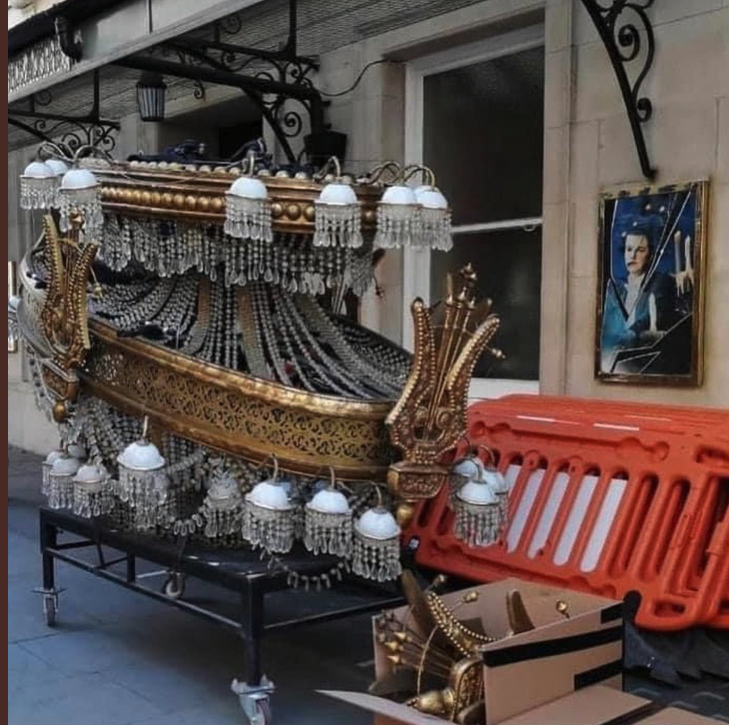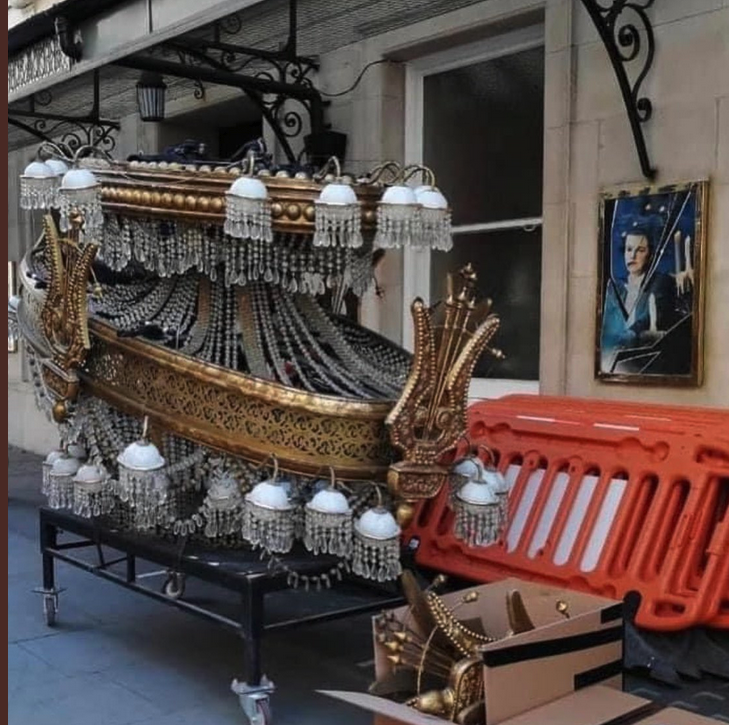When The Phantom of the Opera was unloaded from the Her Majesty’s Theatre last year, it produced the forlorn sight of the original Phantom chandelier resting on the pavement outside the theatre instead of poised over the proscenium from which it famously comes crashing down over the heads of those seated in the stalls.

Andrew Lloyd Webber assured anxious theatregoers that the original Phantom of the Opera WOULD be back as rumours raged over its future.
As he said in a video post on Twitter:
“I promise you, it’ll be the Hal Prince production that comes back in its entirety, hopefully even bigger and better, because, as you all know, I’m a great fan of Hal Prince and he was, in my view, one of the greatest directors that Broadway or theatre ever had.”
Now, it turns out, it IS indeed coming back — minus half its original orchestra. So it is not the original at all.
Long-time percussionist Matt Dickinson, whose job will no longer be there now, posted a heartfelt Twitter thread on Monday,
As he writes,
“At a time when so many Arts organisations are standing by their workforces, one of the most successful shows in history has abandoned theirs.
How can the return of Phantom be considered any sort of success when the actions of RUG and CML have caused so much emotional and financial ruin to the original cast and band?
I sacrificed so much, willingly, to be a part of this wonderful show and yet I will leave with nothing more than the shirt on my back: no severance to speak of and my livelihood and that of my family in absolute tatters. I don’t even have the opportunity to re-audition for my job and am unclear what the future holds.”
The show was originally co-produced by Lloyd Webber’s Really Useful Theatre company with Cameron Mackintosh, and it seemed last year they were at odds over its future, giving different messages about what that might look like. In an interview with Mackintosh that ran in the Daily Telegraph last October, Dominic Cavendish explained the contradictory messaging thus, saying that Mackintosh
clarifies the situation with Phantom, suggesting there was no need for himself and Lloyd Webber to be painted as being at variance, something he partially attributes to the latter’s occasional reticence about his hand in producing decisions. “Before lockdown we opened a fabulous new production in Leicester, which Andrew came to see – and it’s going to go into Her Majesty’s. His company is the co-producer. It was just Andrew being ‘the artist’. When it suits him he’s the lonely artist and when he wants to put on a show he’s the showman. He has always been like that. I just get on with things.”
That includes, it turns out, downsizing his productions to upscale their profitability. He’s already done exactly that with the original Les Miserables, using the closure of the Queen’s Theatre for refurbishment to load out the original RSC production that had run for over three decades — and replace it with the leaner touring version that also at the same time neatly stripped out both the original investors of the show and the original creative team of their royalty payments.
As David Benedict noted in a column for The Stage yesterday, “With Phantom’s band shorn of oboe, harp, trumpets, horns, percussion and with a reduced violin section, a thinner copy is what audiences are going to get.” He points out that the touring version, whose orchestrations will now be used, is a different entity to the West End production:
The London incarnation at Her Majesty’s Theatre, where it began in 1986, is separate, as shown by its advertising campaign, which has been proffering the copyline: “The brilliant original”. That had better be binned, else some musicians – and audiences – might consider examining the Trade Descriptions Act.
Yet last year it was the “brilliant original” that RUG president Jessica Koravos told The Stage would be returning. To make matters worse, the new statement claims that the new “modern instrumentation… will give this timeless score the freshness of a new musical”.
And as with Les Mis, the original investors are also being stripped out of their ongoing participation in Phantom’s profits, too. As Benedict reports,
This leaves the question: why dilute the brand? Instead of sugaring the pill with platitudes, it might have been easier to swallow had they told the truth: it’s about cost.
In a letter sent last November to the original investors, RUG’s chief operating officer Joanne Quillan explained that there was “no economically viable way of reinstating the production in its original form”.
In the same letter, she formally posted a closing notice on the original production, began the process of making a final distribution to the investors and explained they would “not be asking our original investors to contribute their share of reserves and residual profit to the new capitalisation”. This suggests the financing may be moving further in-house to boost company profits.
But right now, in the new pandemic world we’re facing, it might be a better look to be cutting ticket prices, not jobs. Yep, a year of closure has hit the bottom line of the producing business hard; but using this crisis to make swingeing cuts to necessary personnel is a bit like the government using the opportunity to start privatising the NHS by stealth.
Like Boris Johnson undermining one of the crown jewels of our society, namely free health care for all and handing it over to big business to generate profits from, Mackintosh is undermining his own unique legacy in having created not one but two of the greatest West End shows in history, replacing those real jewels with versions that use a lot of costume jewellery of synthesised sound instead.
Putting profits before people has long been the corporate ethos of capitalism; now putting profits before art is the corporate ethos of Cameron Mackintosh, too.

